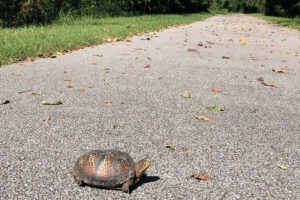
Photo by John Griswold
I have been talking a long time, I realized, about finding the perfect place to live one day. Southern Illinois was my first biome, and I still know it intimately, but summers can be miserably humid and hot. Before every major thunderstorm, people in the St. Louis area keep saying this will be the one to break the heat for the year, but today it was in the 90s with 83 percent humidity. The gnats and flies have been bad too, and the undergrowth is always tangled and riotous with honeysuckle, horse tail, poison ivy, buckhorn, black locust, wild rose, hops, porcelain berry, and grapevines. The soil is hardpan, and the grasses do not behave.
It is not the cool landscape of, say, Inverness, where you can walk up to the Iron Age fort on Craig Phadrig over a flat carpet of grass and wildflowers, through beech and Scots pine, for a view of Beauly Firth and the River Ness.
It is not Vilnius, temperatures now in the low 60s in the day, where you can stroll the old center on cobblestone streets or along the Neris, so well-behaved in its concrete banks, or take a bus out to the spruce and birch forests.
It is not the old-growth conifer forests of Tohoku, with their mountain mosses and ferns, or the rice paddies and ancient hamlets in the valleys.
That is, I finally realized that to get crisp air and uncluttered forest floors, I would need more elevation, a moderating body of water like the cold sea, or a more northern latitude. For the first time in decades I looked at maps to see where places I have enjoyed sit on the globe and in relation to each other. London, eg, which I love, is at 51 degrees north latitude—on a parallel with Sakhalin Island in the Sea of Japan, or British Columbia. St. Petersburg is up with the Nordic countries, the Shetlands, and Alaska.
It is going to be a while. In the meantime, I drove down to true Southern Illinois, past the Kaskaskia River, where corn is standing brown in the fields and soybeans are going yellow before the oaks. On the sidewalks, little beetles scurry to safety in the messy crab grass, dead leaves, and twigs. Around the perimeter of a university building, stunted cedar bushes covered with dry berries grow in the gravel like desert prophets. The smell of them and of the heat rising up, and the smell of the bowling alley in the student center where my after-prom was held, all wax and damp and popcorn, was enough to rock me back.
